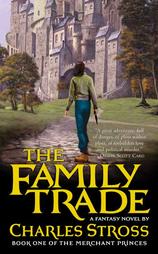Veteran British author Christopher Priest has posted a broadside aimed at this year’s Arthur C Clarke awards.
It’s one of those well-written rants which makes a lot of good points, but then ruins the argument by going over the top in a way that ends up saying more about him than it does about the subject. He starts out well by listing the novels he thinks should have nominated in place of those actually chosen, and eloquently makes their cases. But he then descends into personal attacks on the nominated authors. His harsh words about China Miéville can be read as tough-love constructive criticism (I have yet to read the book in question), but his extraordinarily nasty attack on Charlie Stross takes him well over the line.
It is indefensible that a novel like Charles Stross’s Rule 34 (Orbit) should be given apparent credibility by an appearance in the Clarke shortlist. Stross writes like an internet puppy: energetically, egotistically, sometimes amusingly, sometimes affectingly, but always irritatingly, and goes on being energetic and egotistical and amusing for far too long. You wait nervously for the unattractive exhaustion which will lead to a piss-soaked carpet. Stross’s narrative depends on vernacular casualness, with humorous asides, knowing discursiveness, and the occasional appeal of big soft eyes. He has PC Plod characters and he writes och-aye dialogue! To think for even one moment that this appalling and incapable piece of juvenile work might actually be chosen as winner brings on a cold sweat of fear.
I do have to admire Stross’ good-humoured reaction. Cat Valente also has a well-considered response which acknowledges the positive points.
The whole “Science fiction will only be taken seriously if all this trashy stuff and their fans are driven away” reminds me of this rant about progressive rock by Robert John Godfrey; there are plenty of parallels between the science fiction world and it’s fandoms with the world of progressive rock. In both scenes, why does validation by a sometimes stuffy cultural elite have to matter more than having an enthusiastic and loyal audience?
Priest gives every appearance of wanting SF to be judged by the same criteria as Serious Literary Fiction, in which the depth of characterisation and the author’s skill as a prose stylist are the most important things, rather than the strength of the ideas or the breadth of imagination. He wants an SF where many the things that have a strong appeal to much of the existing audience are heavily watered-down to avoid alienating mainstream audiences. Yes, there is a place for that sort of crossover work, but it’s not the be and and end all of everything science fiction could and should be.
I’ve read and enjoyed several of Priest’s work, including “The Prestige” (I haven’t seen the film), and his earlier “Inverted World” was a very powerful piece of writing. But I’ve also read almost everything Charlie Stross has ever written. The “Internet puppy” has a great deal of energy and humour, and his near future imaginings of the impact of emergent technologies on our lives as surely as relevant to man’s struggle against his social-political environment as anything else. Stross doesn’t write Serious Literary Fiction, and has never pretended to either.
